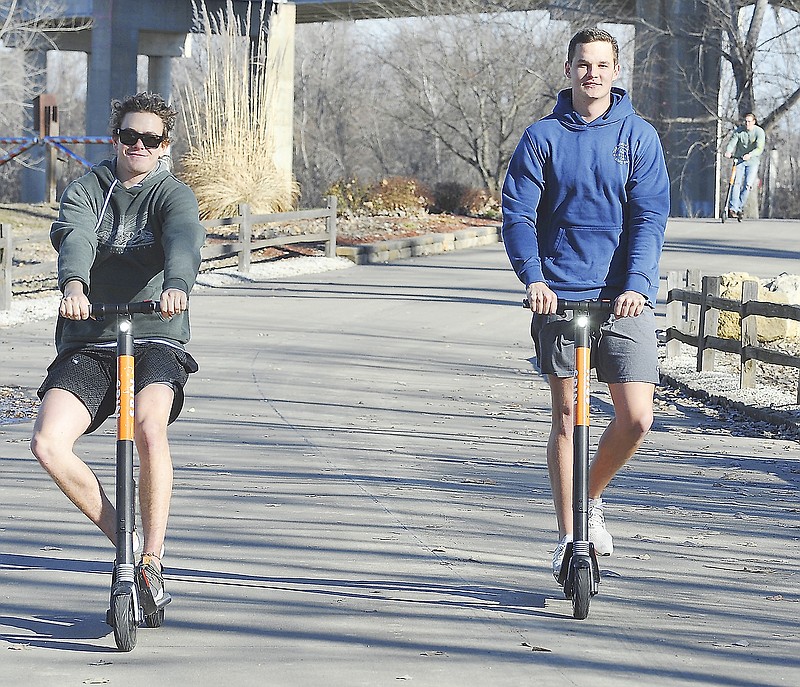Jefferson City could see a new ride-share scooter program in the near future.
The Jefferson City Council heard a proposal Monday night that would set up rules and guidelines for such a business and will be set to vote on it June 21.
The conversation came up when the scooter-sharing company Bird reached out about expanding into Jefferson City. Bird operates scooters in Columbia, Kansas City and St. Louis, among others internationally.
Council members elected to support an open market approach to scooter-sharing programs rather than entering an exclusive contract with a single company.
This means Bird could come into the city, but other companies in the future could as well, with the potential of multiple companies operating in the city.
City Attorney Ryan Moehlman said Bird has indicated a willingness to agree to the proposed regulations.
"This was shared with Bird, and they're willing to sign it," he said. "They want to start operation as soon as possible."
Moehlman said if the bill passes, it will be sent to other scooter companies as well.
The bill doesn't only apply to scooters, although that is what sparked the conversation.
The bill refers to "small vehicles," defining that as scooters, e-scooters, skateboards, bicycles and e-bikes.
It is modeled after Columbia's city ordinance, Moehlman said, but with some changes since that focuses more on programs around the University of Missouri campus.
Any of those companies operating in Jefferson City will be expected to pay 25 cents per ride.
The bill puts restrictions on these companies as well as an expectation for the vehicles to be used in bike lanes and not sidewalks, no-ride and no-parking zones, following rules of the road and riding responsibly.
It also establishes a maximum fleet size when the company goes into business in the city. That number could rise later, but the company would have to go back to the city and city council to show ridership justifies an increase.
"Riders are required to take a photo, when they parked their small vehicles and turn it in, essentially uploaded to the mobile app," Moehlman said. "Then a variety of parking regulations because I think everyone realizes after our last experience kind of a big thing with scooters was parking."
The company will be responsible for ensuring regulations are followed.
Moehlman said companies will be required to place something of a bond with the city so that if the company is not being responsive, the city can take action.
"The city can address scooters that are laying out in the middle of the sidewalk or the middle of the street and actually charge against that bond the company for fixing their problem," he said. "The city can essentially impound scooters that aren't being addressed and making sure the city is getting compensated for any efforts that we're putting into cleaning up their mess."
Moehlman said the goal is to give the company an incentive to make sure the program is being done right with minimally affect on public roads and sidewalks.
The bill also allows for the city to have a a termination clause if it seems as if there are too many problems.
"It basically says if the city council, for whatever reason says, this is too much for Jefferson City, this is impacting our public negatively, there is a broad kind of escape clause that basically says, we're going to wrap this up in a no, this isn't for us," Moehlman said.
Another important aspect of this, he explained, is for the companies to share data with the city about ridership usage, where scooters are being used and the impact it has on the transportation system.
A lack of sharing that data was one of the city's issues with the last system the city had, a bike-share turned scooter-share contract with Spin.
"We ended up not getting nearly as much data as we were hoping for," Moehlman said. "I think we got some complete data for some winter months, which really doesn't tell you a whole lot. We were pretty disappointed with the data that we got in the last program, and so the provision that we here is a little bit more specific as to what we're expecting."

